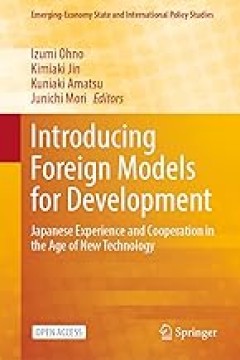Filter by

The Formation of Japan-ROK Security Relations = Meeting the Evolving Cold War…
This open access book argues that Japan-ROK security relations were formed in the process of adjusting the threat perception gap and policy conflict between the two countries. Conventional analyses using a “cooperation or conflict” dichotomy are too limited to capture the complex coordination of interests that security relations entail. In comparison, this book focuses on how, as they inter…
- Edition
- 1
- ISBN/ISSN
- 9789819784790
- Collation
- XI, 216 hlm; ill., lamp.,
- Series Title
- -
- Call Number
- -

Japan’s Arduous Rejuvenation as a Global Power = Democratic Resilience and …
This open access book assesses the profound impact of Japan’s aspirations to become a great power on Japanese security, democracy and foreign relations. Rather than viewing the process of normalization and rejuvenation as two decades of remilitarization in face of rapidly changing strategic environment and domestic political circumstances, this volume contextualizes Japan’s contemporary in…
- Edition
- 1
- ISBN/ISSN
- 9789811361906
- Collation
- XIII, 242 ill; lamp
- Series Title
- -
- Call Number
- -

Modern Japan’s Place in World History
This Open Access book includes chapters on the key turning points in modern Japanese history from the Meiji Restoration to Japan-China diplomatic normalization in the 1970s and beyond. The topics covered include the First Sino-Japanese War, the Russo-Japanese War, the First and Second World Wars, the Manchurian Crisis, the US Occupation, postwar Japan-China relations, and postwar decolonization…
- Edition
- 1
- ISBN/ISSN
- 978-981-19-9592-7
- Collation
- XVIII, 211
- Series Title
- -
- Call Number
- -

History of Innovative Entrepreneurs in Japan
This is the first Open Access book introducing more than 20 of Japan’s leading innovative entrepreneurs from the 17th century to the present. The author outlines the innovative business models created by entrepreneurs including SoftBank’s Masayoshi Son, Fast Retailing (Uniqlo)’s Yanai Tadashi, Honda’s Soichiro Honda, Sony’s Akio Morita, Panasonic’s Konosuke Matsushita, and Toyota’…
- Edition
- 1
- ISBN/ISSN
- 978-981-19-9454-8
- Collation
- XIII, 291
- Series Title
- -
- Call Number
- -

Political Reform Reconsidered
This Open Access book provides a comprehensive analysis of political reforms in Japan since the 1990s, emphasizing the role of ideas in shaping their goals and outcomes. For more than fifteen years following the collapse of Japan’s economic bubble, politicians, business people and academics tackled a range of institutional reforms. The sweeping changes they enacted—covering almost…
- Edition
- 1
- ISBN/ISSN
- 978-981-19-9432-6
- Collation
- XVIII, 215
- Series Title
- -
- Call Number
- -

Introducing Foreign Models for Development
This open access book studies how foreign models of economic development can be effectively learned by and applied to today’s latecomer countries. Policy capacity and societal learning are increasingly stressed as pre-conditions for successful catch-up. However, how such learning should be initiated by individual societies with different features needs to be explained. The book answers this p…
- Edition
- -
- ISBN/ISSN
- 978-981-99-4237-4
- Collation
- XXVI, 338
- Series Title
- -
- Call Number
- -

Micro-Performance During Postwar Japan’s High-Growth Era
The aim of this book is to analyze Japan's high-growth economy, in particular to clarify the kinds of changes in people’s lives that were generated by high growth. The present volume focuses not on the macro-economic mechanisms that expanded the scale of the economy, but on the micro-economic changes that were effected in everyday life. The emergence of a mass consumption society as a result …
- Edition
- 1
- ISBN/ISSN
- 978-981-10-0708-8
- Collation
- XII, 160
- Series Title
- Monograph Series of the Socio-Economic History Society, Japan
- Call Number
- -

Micro-Performance During Postwar Japan’s High-Growth Era
The aim of this book is to analyze Japan's high-growth economy, in particular to clarify the kinds of changes in people’s lives that were generated by high growth. The present volume focuses not on the macro-economic mechanisms that expanded the scale of the economy, but on the micro-economic changes that were effected in everyday life. The emergence of a mass consumption society as a result …
- Edition
- 1
- ISBN/ISSN
- 978-981-10-0708-8
- Collation
- XII, 160
- Series Title
- Monograph Series of the Socio-Economic History Society, Japan
- Call Number
- -

Micro-Performance During Postwar Japan’s High-Growth Era
The aim of this book is to analyze Japan's high-growth economy, in particular to clarify the kinds of changes in people’s lives that were generated by high growth. The present volume focuses not on the macro-economic mechanisms that expanded the scale of the economy, but on the micro-economic changes that were effected in everyday life. The emergence of a mass consumption society as a result …
- Edition
- 1
- ISBN/ISSN
- 978-981-10-0708-8
- Collation
- XII, 160
- Series Title
- Monograph Series of the Socio-Economic History Society, Japan
- Call Number
- -
 Computer Science, Information & General Works
Computer Science, Information & General Works  Philosophy & Psychology
Philosophy & Psychology  Religion
Religion  Social Sciences
Social Sciences  Language
Language  Pure Science
Pure Science  Applied Sciences
Applied Sciences  Art & Recreation
Art & Recreation  Literature
Literature  History & Geography
History & Geography